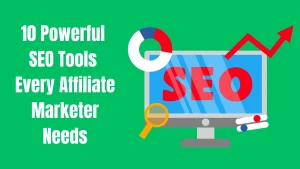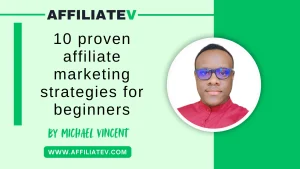How to Do Affiliate Marketing Without Experience (Even If You Have Zero Followers)
Learn how to start affiliate marketing without experience using simple steps, free tools, and beginner-friendly strategies to make your first commission.
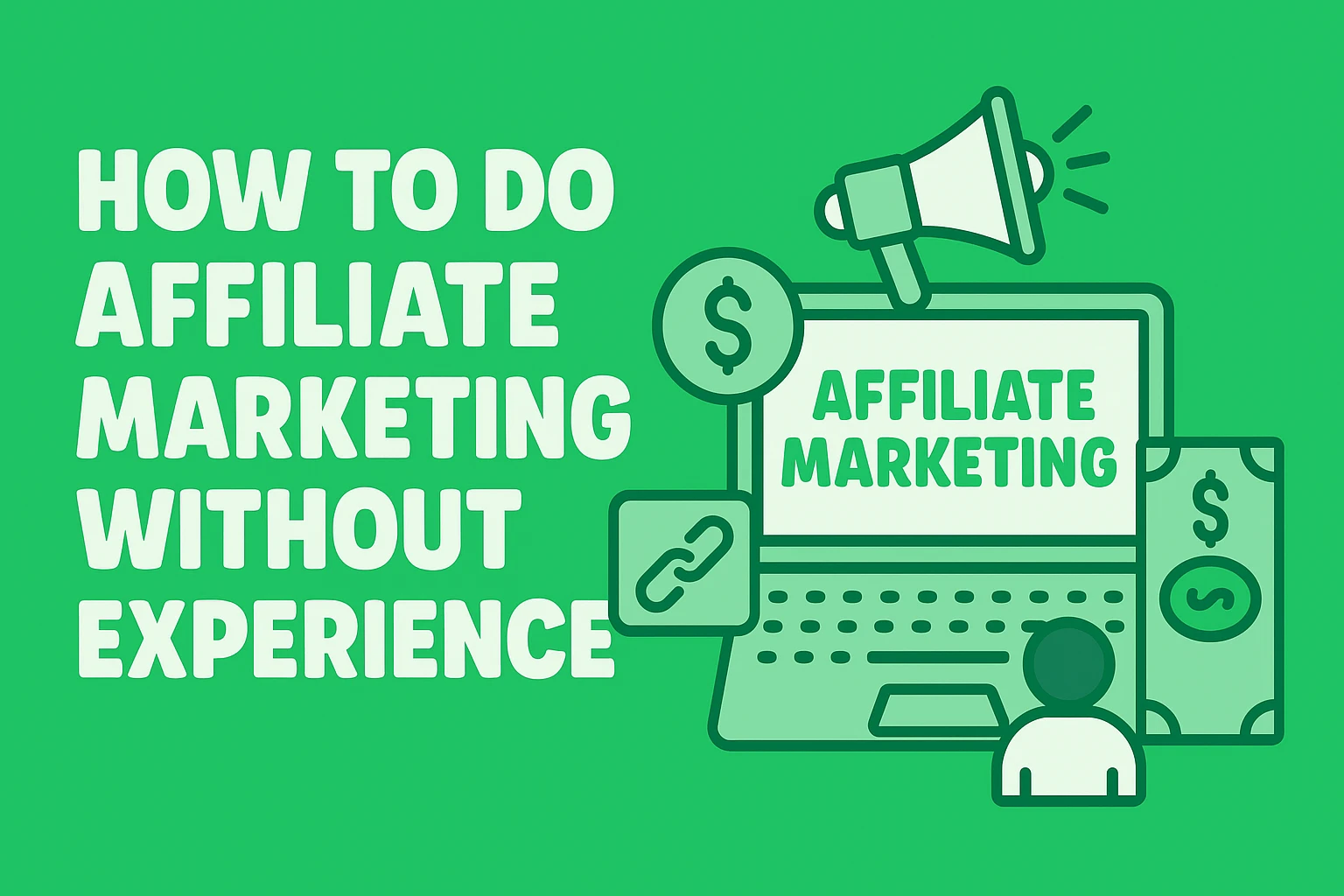
You’ve probably seen people talk about affiliate marketing. On YouTube, TikTok, blogs…like it’s everywhere. They say it’s a great way to make money online.
But if you’ve never done it before, it can feel like a closed door. Maybe you’ve thought, “I don’t have a website. I’ve never sold anything online. I don’t even know where to begin.”
That doubt is normal.
Most people feel it at the start. The truth is, you don’t need experience, a big audience, or fancy tools to get going. You just need a clear plan and the willingness to try.
I’ve met people who started from scratch. No money. No tech skills. No followers. Still, they earned their first commissions within a few weeks.
What made the difference?
They kept things simple, focused on one platform, and shared products they actually believed in.
Affiliate marketing without experience is not only possible, it’s practical. But only if you stop overthinking and start taking small actions that build up over time.
This guide will walk you through the exact steps that beginners use to go from zero to their first sale. Let’s break it down.
Key Takeaways
- You don’t need a degree, money, or tech skills to get started.
- Pick a niche you enjoy and people are searching for.
- Use free platforms like YouTube or Facebook to share your content.
- Focus on helping, not selling. Reviews and tutorials work well.
- Choose affiliate programs that accept beginners.
- Don’t obsess over tools—use what’s free and simple.
- Track your progress, stay consistent, and give it 90 days.
What Is Affiliate Marketing (And Why You Don’t Need Experience to Start)
Affiliate marketing is a simple idea. You promote a product or service created by someone else. When someone clicks your unique link and makes a purchase, you earn a piece of the sale. That’s it.
You’ve probably done something similar without realizing it.
Ever told a friend about a great coffee brand or a phone app you use every day? If they tried it because of your recommendation, you influenced their decision. Now, imagine if the company gave you a small reward for sending them that customer. That’s affiliate marketing in real life.
Here is a simple infographic breakdown of how affiliate marketing works.
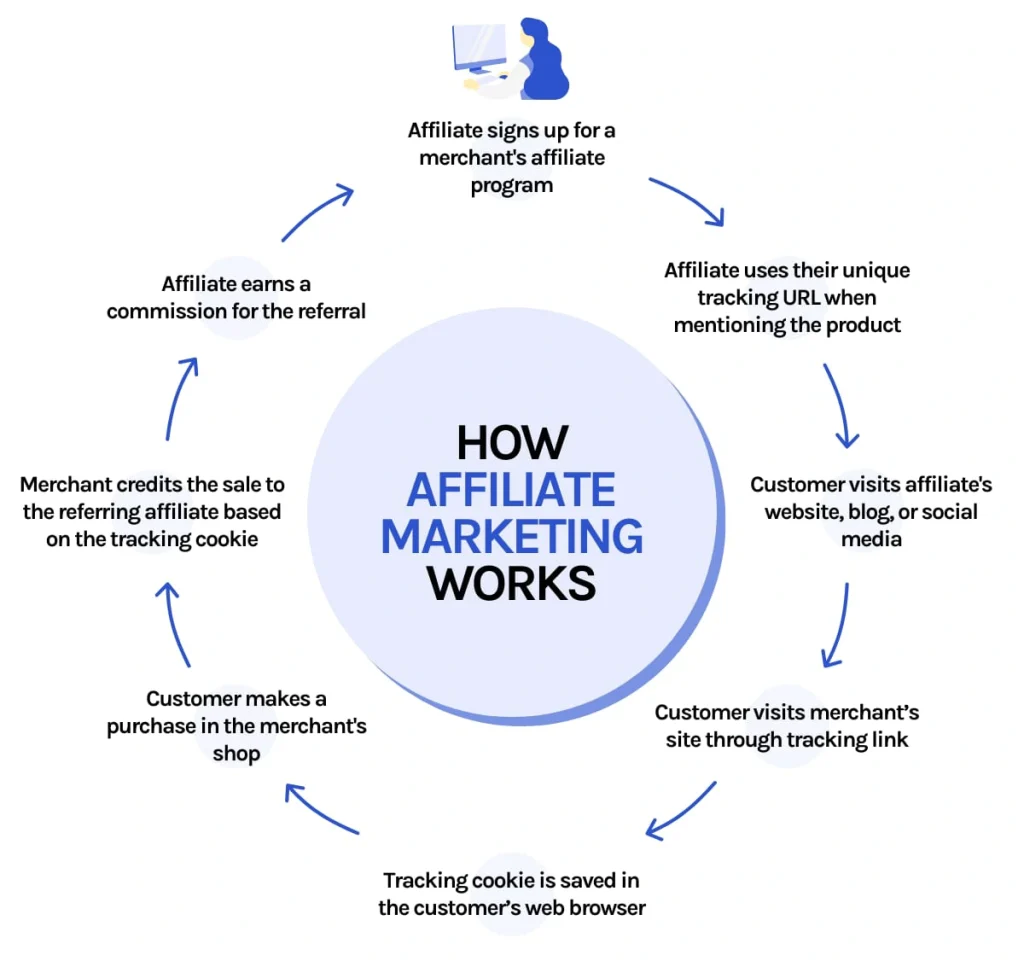
What makes this so beginner-friendly is that you don’t need to create your own product. You don’t need to know how to build a website. You don’t need to be good with tech. You can start with what you have—your phone, your voice, and your personal experiences.
Some people begin just by sharing their favorite tools or products on social media or in comment sections of communities they already belong to. Others write short posts on free blogging platforms or film quick videos explaining why they like something.
You’re not selling in a pushy way. You’re just helping someone solve a problem or find something useful. And you earn a reward for it. That’s the core of affiliate marketing, and you don’t need experience to do it well. You just need to be honest, helpful, and willing to share.
Recommended Reading: How To Start Affiliate Marketing in 2025: A Comprehensive Step-by-Step Tutorial Guide for Beginners
Common Fears Beginners Have (And Why They Don’t Matter)
If you’re brand new to affiliate marketing, it’s normal to feel unsure. Most people talk themselves out of it before they even begin. Let’s look at the biggest fears beginners have—and why they don’t hold up.
Fear 1: “What if I fail?”

This one stops a lot of people. They picture spending hours trying to make it work and getting nothing in return. But the truth? Failure only happens when you stop. If your first post doesn’t work, try a different angle. Everyone starts rough.
I remember one friend of mine in a private group I’m part of—he posted product links for two months, got zero clicks, and almost gave up. On month three, one of his videos took off all of a sudden. That one post made $147 in commissions. He didn’t get better. He just kept showing up.
Fear 2: “I need a website before I can start”
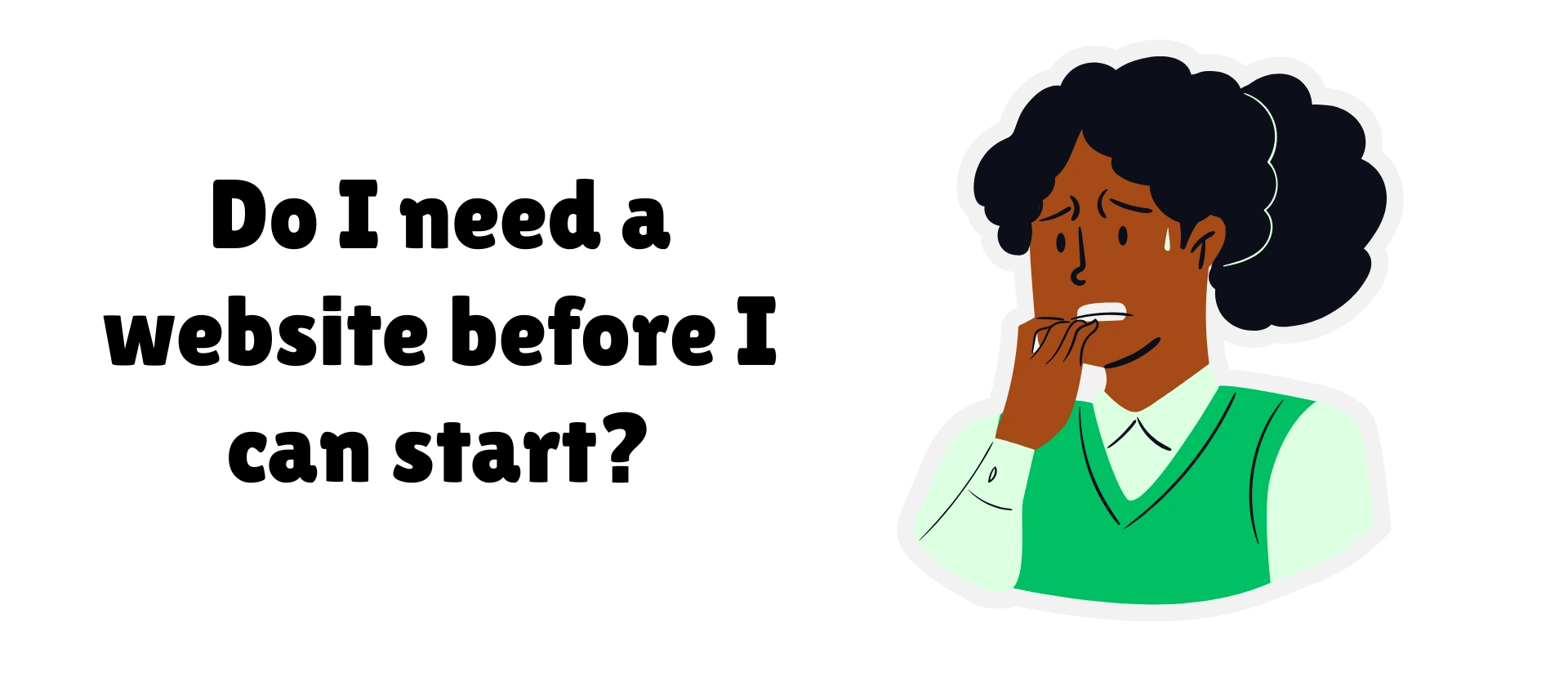
Nope. That was true ten years ago. Today, people are making affiliate income from platforms like TikTok, YouTube Shorts, Facebook Reels, and even Reddit.
For example, here’s How I Made My First $500 Using Reddit for Affiliate Marketing (Without Spamming)
You can post content, drop a link, and still earn. A website can help long-term, but it’s not a must to begin. Many affiliate programs let you use social links. So you can literally start with your phone and a few honest recommendations.
Further Reading: Do You Need a Website to Start Affiliate Marketing? Here is My Take
Fear 3: “There are too many people doing this already”
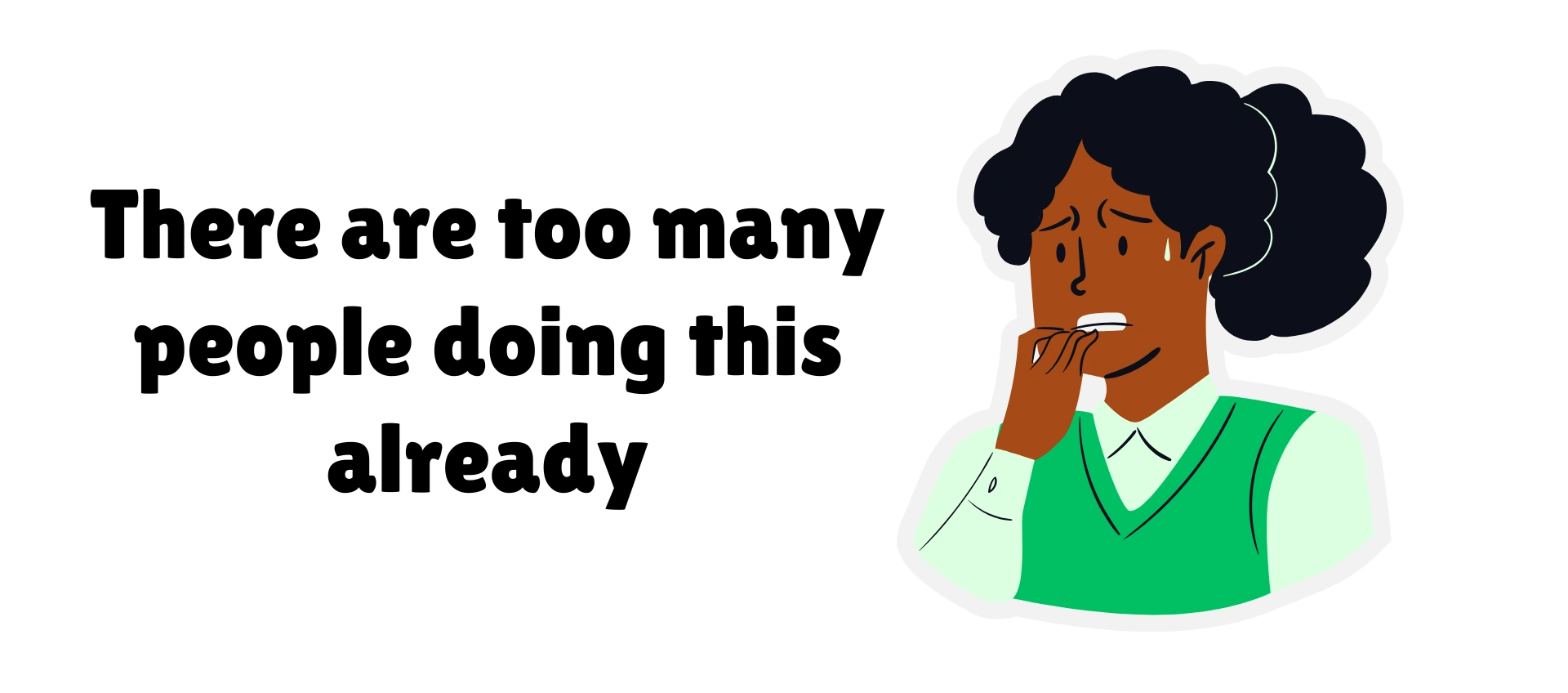
Sure, lots of people are trying it. But most don’t stick with it. And the internet isn’t running out of buyers. Millions of people search for product advice every day.
The key is to be specific. Instead of trying to promote “fitness,” talk about gear for beginners who work out at home. Instead of “tech,” focus on tools that help remote workers. Niche down. Speak to real problems. There’s still plenty of space.
These fears feel real, but they don’t have to stop you. Most people who succeed with affiliate marketing weren’t confident when they started. They just kept moving through the doubt. You can too.
How to Pick the Right Niche (Without Overthinking It)
One of the biggest things that holds beginners back is picking a niche. They feel like it’s a life-or-death decision. It’s not. You just need to find a space where three main things overlap: something you like, something you know at least a little about, and something people are already searching for.
Start with your interests. What do you enjoy talking about? What do people often ask you for advice on? You don’t need to be an expert, you just need to care enough to learn and share.
Next, think about demand. Are people already looking for this stuff online? Use free tools like Ubersuggest to check what people are searching for.
Google Trends can show if your topic is growing or fading. A quick search on AnswerThePublic will give you real questions people are asking. If you see a lot of curiosity around your topic, that’s a good sign.
For example, if you’re into fitness, you could focus on home workouts for beginners. If you’re into personal finance, think about money-saving tips or beginner investing tools. If you love animals, pet care is a huge space, especially if you narrow it down to something like dog training or healthy treats.
The goal is to start simple and build from there. You don’t need the “perfect” niche, you just need one that gives you enough fuel to create content and stay consistent.
Want a deeper dive into picking a niche that fits your goals? I wrote another guide you’ll find helpful: [How to Choose the Best Niche for Your Affiliate Marketing Business]—it breaks down the process with more examples and a step-by-step filter you can use.
Also, below is an infographic illustrating how to find a perfect niche for you.
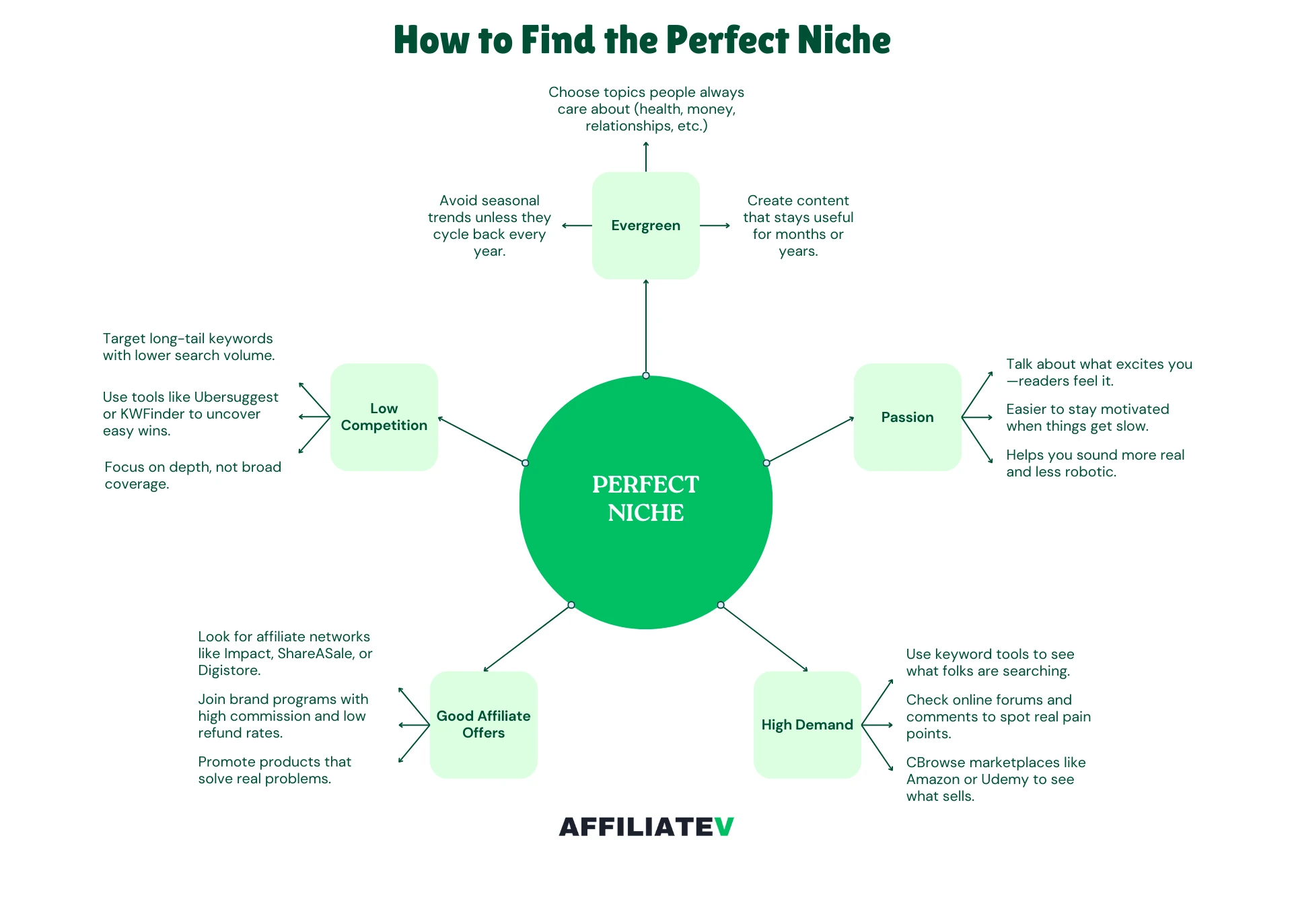
Best Free Tools and Platforms for Beginners
Starting affiliate marketing with zero experience? Don’t overcomplicate it. You don’t need ten different tools or a full-blown website on day one.
What you do need is a way to share useful content, some affiliate programs that actually accept beginners, and a few free tools that help you work smarter, not harder.
I’m laying it out the same way I would if we were on a call together.
Platforms to Get Your Content Out There
You need a place to show up and drop value. These platforms are free and beginner-friendly, even if you’ve never created content before.
- YouTube – Works great if you’re okay talking or showing your screen. Review products, answer questions, or walk people through simple tutorials.
- Medium – You like writing? Post quick reviews or guides. You don’t need to build a blog from scratch. Just start here.
- TikTok – If you’ve got a phone and an opinion, you can make content. Short, fast, and still wide open for affiliate marketers.
- Facebook Groups – Find groups in your niche. Don’t spam. Join the convo, share tips, and drop your link where it fits.
- Pinterest – Good for visual niches like DIY, fashion, fitness, and food. Create simple pins that lead back to your affiliate content.
- Reddit – If you know how to be helpful without being salesy, Reddit is gold. Join subreddits related to your niche, answer questions, and build trust. It’s a slower game but a loyal one.
Now here’s the thing: don’t try to be everywhere. You’ll burn out fast.
Pick one or two platforms where you feel comfortable showing up consistently. Get good at those before adding anything else.
What matters most in affiliate marketing is not being on every channel. It’s showing up regularly and actually helping people on the ones you choose.
Affiliate Programs That Don’t Make You Jump Through Hoops
One of the biggest things that stops beginners? Thinking you need a website, an email list, or thousands of followers just to join an affiliate program. That’s false.
There are legit programs out there that accept people with zero experience.
These networks let you get started fast with no fancy credentials or a big audience.
- Amazon Associates – Easy entry. Tons of products. Just know you need 3 sales in 180 days to stay active.
- ClickBank – No approval hassle. Mostly digital offers. Commission rates are solid.
- ShareASale – Hundreds of brands across every niche. Simple dashboard, easy tracking.
- Rakuten – Known brands, decent commission options. Some offers take longer to get approved, but it’s still beginner-friendly.
- Impact – A clean interface and a good mix of newer and big-name brands. Plenty of solid programs that don’t require a long resume.
Start with one or two of these programs. Don’t waste time applying to everything. Get familiar with how links work, how offers convert, and what your audience actually clicks on.
Once you land your first few commissions, you can explore more advanced or niche networks.
Recommended Reading: 15 Best Affiliate Networks That Actually Pay.
Free Tools That Actually Help
If you’re starting affiliate marketing and you don’t have the experience, the tools can either make things easier or completely overwhelm you.
I’ve been through that phase where you try 20 things and still feel stuck. Now, these are the tools I either still use or recommend to students who are building from scratch.
They’re simple, free (or have free versions), and they do what you actually need.
1. Canva
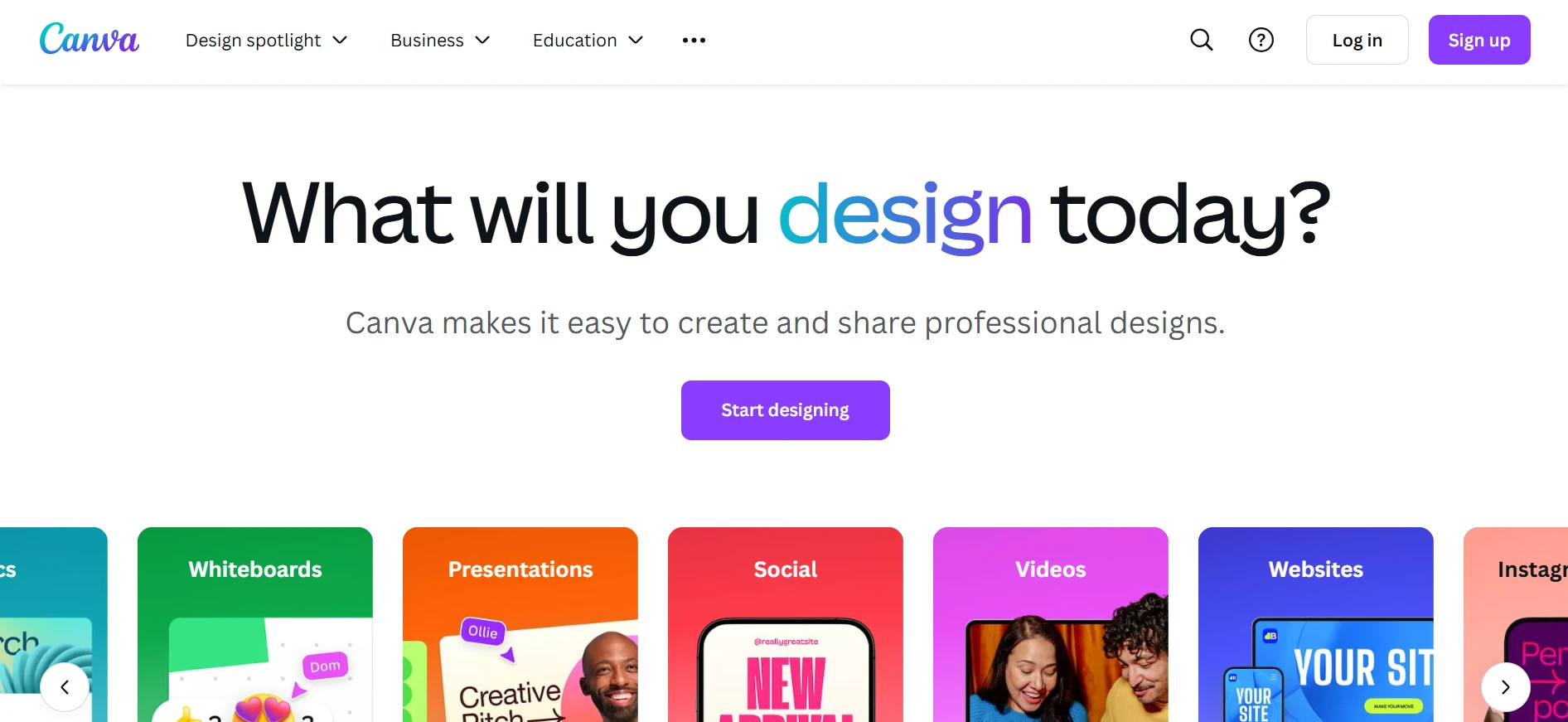
You don’t need to be a designer or spend hours trying to make things look good. Canva helps you create clean graphics for your blog, YouTube thumbnails, Pinterest pins, or lead magnets. It’s drag-and-drop simple.
I’ve even used it to make quick PDFs and checklists to give away.
2. ThirstyAffiliates
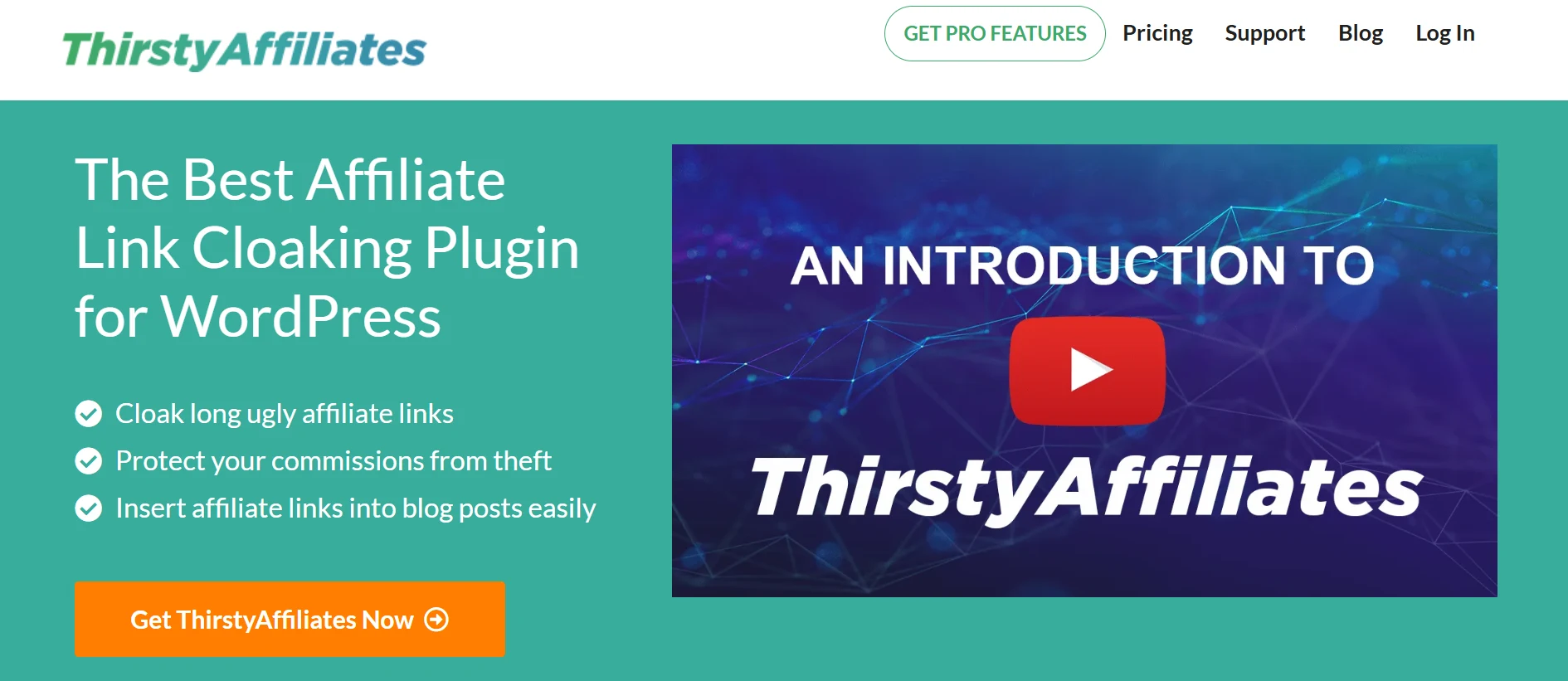
If you’re using WordPress, ThirstyAffiliates is one plugin I always recommend, especially if you’re serious about keeping things clean and organized. It helps you turn those messy, random-looking affiliate links into short, branded URLs that actually look trustworthy.
For example, instead of something like “example.com/product?id=24931xyz“, you get “yourdomain.com/recommends/toolname“. That small change makes a huge difference in clicks.
People are more likely to trust a link that doesn’t scream “spam.” Plus, you can group, track, and even update your links across your site in one place. No digging through posts. It saves time and keeps your site looking sharp. Perfect for beginners who want to look like pros.
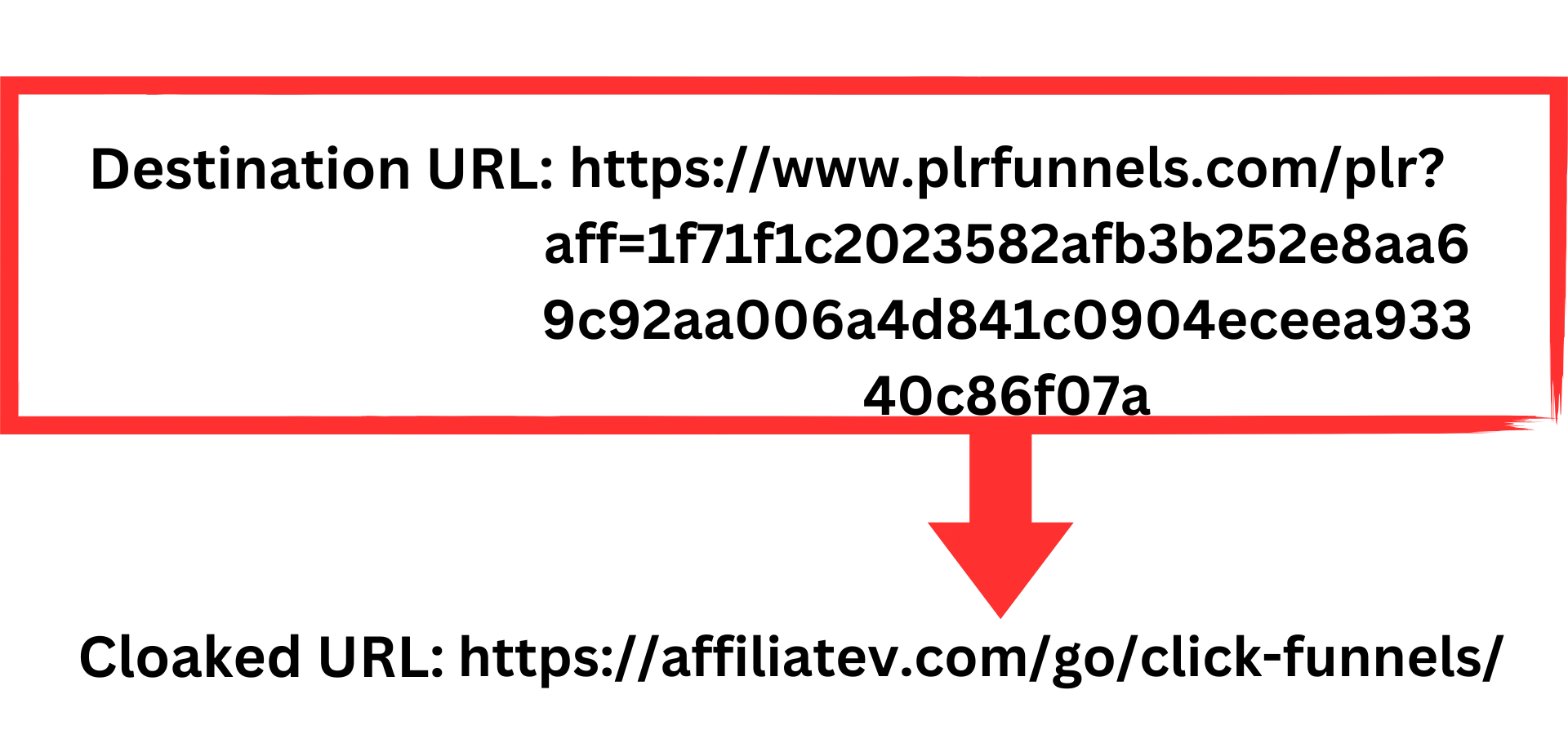
You can also organize your links by category, which helps a lot when you’re juggling multiple offers.
3. WordPress.com
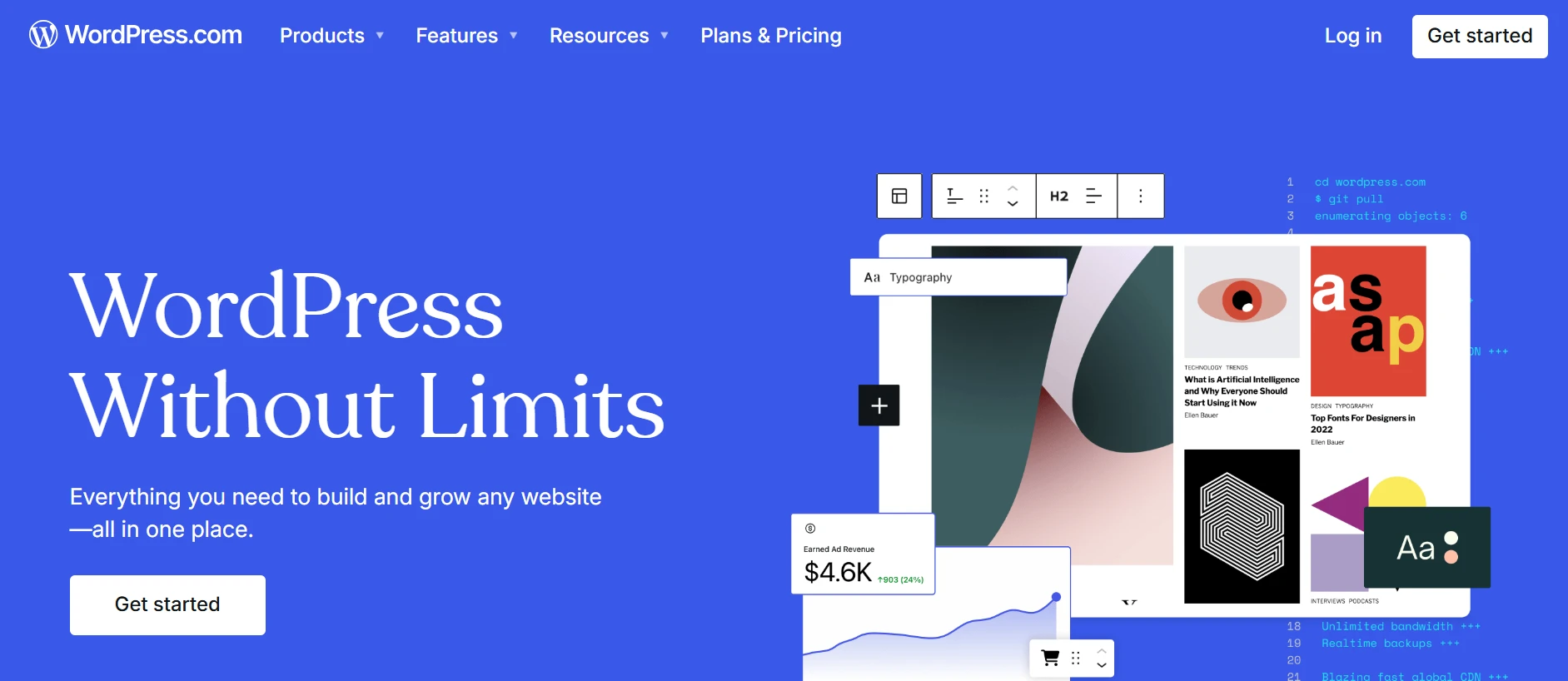
You don’t need a fancy self-hosted site when you’re just starting. WordPress.com is a solid option to get going fast.
It gives you a free space to write blog posts, share product reviews, or even drop affiliate links without dealing with hosting, plugins, or domain setup. You just sign up, pick a basic layout, and start publishing. It’s great for testing the waters without spending money.
Later on, if things pick up and you want more control (like custom branding or plugins like ThirstyAffiliates), you can upgrade to a paid plan or move to WordPress.org. But in the beginning? WordPress.com is more than enough to start building trust and traffic.
4. Ubersuggest
I use this when I’m researching content ideas or checking if a keyword is even worth writing about. It’s not as advanced as Ahrefs or Semrush, but it gives you what you need: search volume, keyword ideas, and a rough idea of how hard it is to rank.
5. Pretty Links
Similar to ThirstyAffiliates, but with more customization and tracking. I like how it shows me exactly how many clicks each link gets. It’s especially useful if you’re testing different offers or running content across platforms.
6. Systeme.io
Funnels, landing pages, email automation—without needing to piece together ten tools or pay monthly fees. It’s what I recommend to beginners who want a simple all-in-one setup. You can build a basic funnel in a few hours without touching code.
7. ConvertKit
For email marketing, this one’s solid. The free plan gives you landing pages and basic automation. I like how it’s built for creators and not corporate marketers. You can tag your subscribers based on what they clicked, which helps you promote the right offers later on.
8. Google Docs
Still one of the most underrated tools out there. I use it to plan content, write emails, draft blog posts, and organize affiliate offers. You don’t need a fancy setup. Just start writing things down, get your ideas out of your head, and stay consistent.
You don’t need to use all of these right away. Pick the ones that match where you are right now. If you’re writing blog content, start with Google Docs and WordPress. If you’re building a list, learn ConvertKit or Systeme.io. Keep it simple, but stay consistent. That’s what moves things forward.
Create Simple, Helpful Content That Converts
You don’t need a blog to get started. Social media is more than enough. Personally, I have done it. Also, I’ve seen people make their first commissions just by sharing a tip on TikTok or writing a post on Facebook. The trick is to stop overthinking and focus on being helpful. That’s it.
What does “value” even mean? It’s not about sounding smart. It’s about giving people what they actually need before they buy. That could be:
- A quick review of a product you tried
- A side-by-side comparison of two tools you’ve used
- A short how-to guide or tip that solves a problem
- A beginner-friendly tutorial that walks through a setup
- Even just showing how you use something and what worked for you
The goal isn’t to go viral. The goal is to build trust with real people who are already searching for what you’re talking about. If you’re using social media, I’ve got a post that breaks down how to actually get people to engage and care: 6 Ways to Boost Social Media Engagement for More Sales—give it a read.
Here’s the honest part: your first few posts might suck. That’s normal. Mine did too. You get better by doing. What matters is starting. You don’t need fancy gear, perfect lighting, or polished writing. You just need to show up and be useful.
If you want a full breakdown of how to create content that actually brings in clicks and commissions, I wrote this for you: How to Create Affiliate Content That Ranks And Converts. It walks you through the whole thing—step by step.
Here’s the section with your personal tone and practical advice baked in:
Track Results and Stay Consistent (Without Burning Out)
At first, checking stats might feel pointless—especially if you’re not seeing clicks or sales yet. But tracking is how you figure out what’s working and what’s just noise. Most affiliate programs come with a basic dashboard that shows you clicks, conversions, and commissions. Check it once or twice a week. Don’t obsess—just keep an eye on patterns.
If you’re not ready for full-on analytics tools, start with something simple:
- Google Sheets – Track your content, links, and daily actions
- Airtable – A little more flexible than Sheets, and great for visual planning
- Clicks and sales – Just knowing which post brought in a click can tell you what to double down on
- Top pages or platforms – See which ones are bringing you traffic
- Email opens and link clicks – If you’re doing email, this shows how people respond
You don’t need to understand 10 marketing metrics. Just start with a few:
- How many people clicked your link this week?
- Did any of them buy or sign up?
- Which post or platform brought them in?
That’s enough in the beginning. Set tiny goals. First click. First lead. First $10. Celebrate each one. It builds momentum. Then keep going.
Want more help finding the right tools for this stuff? I put together a list: Top 14 Free Link Tracking and Management Tools for Affiliate Marketers. It’s beginner-friendly and packed with options that don’t require a tech degree.
Conclusion
Final Thoughts: You Don’t Need Experience—You Just Need to Start
If you’re still wondering if you can do this, the answer is yes. You don’t need a blog. You don’t need a massive audience. And no, you don’t need to “know it all” before jumping in. The only thing you need is a decision to stop watching and start doing.
Affiliate marketing without experience isn’t a myth—it’s exactly how most of us got in. What matters is showing up consistently, choosing tools and platforms that fit you, and helping people solve real problems with useful recommendations.
Start simple. Stay focused. Keep learning as you go.
You won’t get it perfect. You’re not supposed to.
But if you stay in the game, that first click, that first commission, that first $100—it’s coming. Just don’t quit before you get there.
Frequently Asked Questions
Can I start affiliate marketing with no money and no experience?
Absolutely. Most people do. You don’t need a budget to get started, and you don’t need a background in marketing either. Affiliate programs like Amazon, ClickBank, and Digistore24 are free to join. You can start promoting products using free tools like Google Docs, Canva, and Bitly. Platforms like TikTok, Facebook Groups, Reddit, or Medium let you create content without paying a dime. The key is starting with what you do have—your opinion, your time, and a willingness to learn. Many of my students started with zero cash and picked up their first commissions by being helpful and consistent. Focus on helping people first. The money follows.
What’s the easiest way to make my first affiliate sale?
The simplest path? Talk about something you already use and trust. Pick one platform—maybe TikTok, Facebook, or YouTube Shorts—and just start sharing. Make a short video, post a quick review, or write a post that explains how the product helped you. You don’t need a fancy script. Just be honest. Focus on a specific problem the product solves, then drop your affiliate link with a call to action. For example, “This helped me get better sleep—here’s where I got it.” Real stories connect. Don’t chase trends. Just speak like you would to a friend. That kind of content builds trust—and trust brings sales.
Do I need a website to do affiliate marketing?
No, not at all. A website can help later when you want to scale, but it’s not a must when you’re starting out. Platforms like Medium, Quora, Reddit, and social media already have traffic. You just need to show up with something helpful. Post a product review, a how-to guide, or share your personal experience with a tool or service. If people find value in what you shared, they’ll click your link. That’s it. I’ve seen folks land their first sales from a single comment or a short video—no website involved. Focus more on value, less on building from scratch. Keep it simple.
How long does it take to make money with affiliate marketing?
It depends on how consistent you are. Some beginners get their first commission in a few weeks. Others might take a few months. If you treat it like a side hustle and post regularly—say 3 to 5 times a week—you’ll learn faster, get better, and build trust. Most people who give up do so before they’ve given it enough time. Affiliate marketing isn’t a quick win. It’s more like planting seeds. Some grow fast. Others take longer. The trick is to stay patient, track your results, and double down on what works. Don’t expect overnight results, but do expect progress if you stay in the game.
What are the best affiliate programs for beginners?
Start with affiliate networks that are easy to join and don’t require a big audience. Amazon Associates is a great choice if you want to recommend everyday products. ClickBank is full of digital products—some pay 50% or more per sale. ShareASale and Impact give you access to hundreds of brands, while Digistore24 is beginner-friendly and quick to get approved. These platforms let you browse offers, grab links, and start promoting right away. Each one has different strengths, so pick one that fits your niche. You don’t need to join all of them. Just one is enough to get started and stay focused.





